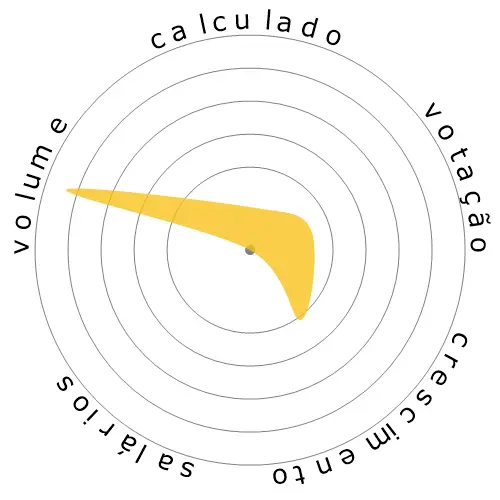Zeladores e Limpadores, Exceto Empregadas Domésticas e Limpadores de Manutenção Doméstica




As pessoas também visualizaram
Risco de automação calculado
Alto Risco (61-80%): Empregos nesta categoria enfrentam uma ameaça significativa da automação, pois muitas de suas tarefas podem ser facilmente automatizadas usando tecnologias atuais ou de futuro próximo.
Mais informações sobre o que é essa pontuação e como ela é calculada estão disponíveis aqui.
Enquete do usuário
Nossos visitantes votaram que estão incertos se esta ocupação será automatizada. No entanto, o nível de risco de automação que geramos sugere uma chance muito maior de automação: 76% chance de automação.
O que você acha que é o risco da automação?
Qual é a probabilidade de que Zeladores e Limpadores, Exceto Empregadas Domésticas e Limpadores de Manutenção Doméstica seja substituído por robôs ou inteligência artificial nos próximos 20 anos?
Sentimento
O gráfico a seguir é incluído sempre que há uma quantidade substancial de votos para gerar dados significativos. Essas representações visuais mostram os resultados das enquetes dos usuários ao longo do tempo, fornecendo uma indicação importante das tendências de sentimento.
Sentimento ao longo do tempo (anualmente)
Crescimento
Espera-se que o número de vagas de emprego para 'Janitors and Cleaners, Except Maids and Housekeeping Cleaners' aumente 3,1% até 2033
Emprego total e estimativa de vagas de emprego
As projeções atualizadas são devidas 09-2025.
Salários
Em 2023, o salário anual mediano para 'Janitors and Cleaners, Except Maids and Housekeeping Cleaners' foi de $ 35.020, ou $ 16 por hora
'Janitors and Cleaners, Except Maids and Housekeeping Cleaners' receberam 27,1% a menos que o salário médio nacional, que ficou em $ 48.060
Salários ao longo do tempo
Volume
A partir de 2023 havia 2.172.500 pessoas empregadas como 'Janitors and Cleaners, Except Maids and Housekeeping Cleaners' dentro dos Estados Unidos.
Isso representa cerca de 1,4% da força de trabalho empregada em todo o país
Dito de outra maneira, cerca de 1 em 69 pessoas são empregadas como 'Janitors and Cleaners, Except Maids and Housekeeping Cleaners'.
Descrição do trabalho
Mantenha os edifícios em condições limpas e ordenadas. Realize tarefas de limpeza pesada, como limpar pisos, lavar tapetes, lavar paredes e vidros e remover lixo. As tarefas podem incluir cuidar do forno e da caldeira, realizar atividades de manutenção de rotina, notificar a gestão da necessidade de reparos e limpar neve ou detritos da calçada.
SOC Code: 37-2011.00


Comentários
Leave a comment
Don't get me wrong, i think it could be done, i just think the cost would be outrageous and that somebody would still often have to step in for unusual messes and vandalism.
A. Invest significantly in equipment and processes that make the tasks much easier to do, and
B. Put a lot of personal responsibility on the people causing messes, generating the trash, and otherwise making the work that is needed to be done.
For A, restrooms would have to be redesigned with standards for toilets, urinals, sinks, etc where automated brushes could easily reach them. Trash receptacles would also need regular emptying and cleaning. It could be done, and I believe they've even invented self-cleaning restrooms where it basically treats the entire interior like a dishwasher, locking it off and doing high pressure sprays with sanitizing chemicals. It would be very very expensive to redesign them in such a way, not to mention the ongoing maintenance costs of such precision equipment. Similar with locker/shower rooms, kitchenettes, and break areas.
For B, in order for desk waste receptacle collection to be automated, office workers would need to actually throw trash inside the trash can and not beside, behind, or underneath. They would need to have it in a fixed position, and keep the area in front of it clear, and not obstructed with personal items, stacks of paper, or other junk. Similar to automated vacuum robots, they would need the area they're to clean free of obstacles. The best way to clean greasy fingerprints off glass doors is simply not have them there in the first place; train people to put their hands on the handle. Office workers in particular are incredibly inconsiderate of the work they leave for others, and office facilities would rather hire double the amount of cleaning staff to be demeaned and jump through ridiculous and unnecessary hoops.
The amount of investment needed to automate janitorial tasks would be incredibly high. If they really wanted to save money, they could instantly probably cut 25-50% of their workforce budget by being considerate to others. But they'd much rather waste money on digging their heels into classism, ensuring there are "servants" to look down upon.
I am currently writing this comment using an artificial intelligence aid. It is called Grammarly. I write rather well on my own, the help though is appreciated. It can improvise upon what I'm going to write.
Does this mean it reads my mind? No, it uses algorithms to prognosticate what is coming based upon my previous writing. From that, it can then access other algorithms that study grammatical rules and policies. That allows it to use an algorithm to assist my writing by editing.
My point being case variables in programmatic instructions can be defined so as to "follow" and "cope" with people. I work as a custodian presently for our county's public schools, which we have from pre-school to grade twelve. Children are the most unpredictable of all humans.
I can easily see how timing schedules, sensors, algorithms could all be put in place to cut my workload by two-thirds, or more. My work can be greatly automated. Still, there would need to be technicians both to repair the physical and mechanical aspects and to repair the computing code at times. So I say it could go either way.
Deixe uma resposta sobre esta ocupação